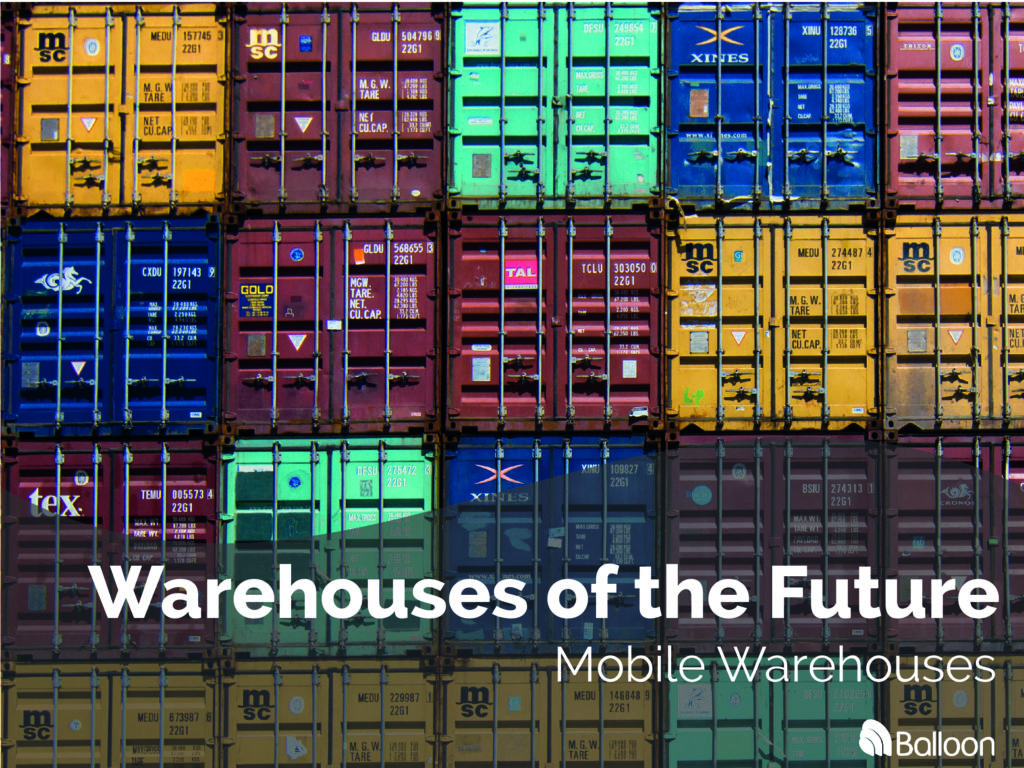Warehouses of the Future: Mobile Warehouses
Blog Post by Claire Kerr
Chances are, you haven’t used a mobile warehouse yet. But it may not be long before you do.
The distribution industry is suffering an ongoing decline in the amount of available warehousing space. On top of this, recent stockpiling in preparation for Brexit has limited storage even more.
Against of backdrop of growing delivery demands from customers, the logistics industry is going through some dramatic changes. With necessity being the mother of invention, it’s no surprise therefore that companies are coming up with ever more innovative warehouse strategies, and mobile warehousing could be the answer to several of these distribution challenges.

What is a mobile warehouse?
A mobile warehouse is a facility to store goods, which isn’t permanently static, or based in a building. It could be a trailer loaded with ready-packed goods, or a barge on the Thames filled with seasonal or frequently purchased items.
Of course, it will have originally been supplied from a separate, static warehouse. But these goods will make it to their new owners far more easily and quickly when serviced from a mobile facility.
What are the benefits of mobile warehouses?
The main advantage of a mobile warehouse is that the goods leave the warehouse at a point that is closer than normal to the customer. This makes last mile delivery much faster.
Imagine how many deliveries are made every day to customers in the centres of big towns and cities. If you can pack up a lorry or floating vessel with the orders for that city for the day, then park it somewhere central, final-mile deliveries can be made throughout the day from this central point.
And if there are other goods that are high-volume and likely to be ordered for delivery to customers in the same area, these can be packed and ready for shipping too. Orders that come in throughout the day can quickly be fulfilled from the mobile warehouse and delivered by foot or bike, or other low-cost methods. If orders had to be delivered instead from an out-of-town warehouse, they would take longer. And having to make more trips into the city centre would cost the supplier more.
Having a mobile warehouse could help a company be far more competitive on price or allow it to compete by offering a very short delivery timescale. If you can offer a one-hour delivery to workers in certain city centres, then your proposition offers a clear differentiation that may be the deciding factor when your customers choose where they buy from.
A mobile warehouse could also handle returns. Mobile warehouses located in city centres could collect returns during the working day and transport them back to a central warehouse at night. This would eliminate return postage costs for customers and potentially speed up the returns process too.
With warehouse space in high demand, and commanding a significant price premium too, mobile warehousing could be the solution to many distributors’ Brexit headaches. The very high, and fairly short-term need for space during Brexit could be met using temporary mobile trailers.
Mobile warehousing also offers a simple solution for retailers looking to stock up in advance of high-sales periods, like Christmas and Black Friday. Seasonal demand like this won’t always warrant extra permanent warehousing. So, temporary storage of goods in trailers or shipping containers can ease a few warehousing headaches for a short period.
Is anyone using mobile warehousing yet?
Serve – a company that provides decentralised logistics services via blockchain – recently announced the launch of technology for mobile warehousing. The technology can help distributors to pick, pack, sort and distribute products more quickly and at a lower cost.
You won’t be surprised to learn that Amazon is also one of the pioneers of mobile warehousing. It applied to patent “transient warehouses”, which could supplement permanent warehousing. While the company doesn’t seem to have implemented anything as yet, with the huge share it has of many markets around the world, it wouldn’t be a surprise to hear of Amazon employing something like this.
Despite the stockpiling associated with Brexit, the shortage of warehouse space is much more marked in the US than it is in the UK. And companies are already devising mobile warehousing solutions for customers. Logistics transportation providers, Milestone, lease trailers for companies to use as temporary warehouses. And temporary doesn’t just mean a few months – trailers can be leased for several years.
Are mobile warehouses the future?
It’s clear that mobile warehouses have real promise. They are particularly suited to today’s ecommerce sales model, giving rapid despatch and delivery. And they will help distributors to straddle the gap between their large lower-cost, rural warehouses and their customers, offering smaller, temporary sites in expensive urban areas.